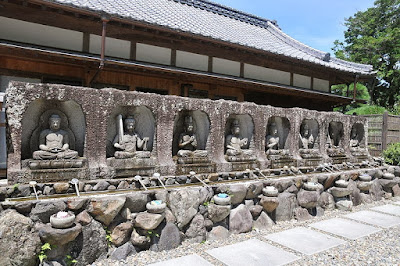Dear Haijin, visitors and travelers,
At CDHK we have done a lot of pilgrimages, one of the pilgrimages was on Shikoku Island along the 88 temples of Kobo Daishi, the once in a lifetime pilgrimage of Buddhists. I love to look back at that beautiful pilgrimage.
I remember that we first travelled with Trans Siberian Railway straight through the former USSR and read that wonderful novel by Paulo Coelho, Aleph. At the end of that journey we arrived on Shikoku Island and became O'Henro or pilgrims of Shikoku. What a wonderful time that was here at CDHK. We visited all the 88 temples in two months and (maybe) found peace of mind.
To become real O-Henro we had to change clothes (virtualy) without those special clothes we couldn't do the Shikoku Pilgrimage. I remember that we experienced the beauty of all the temples and for sure, as I look at myself, that changed my life.
 |
| O-Henro traditional clothing |
Heart Sutra:
Heart of the Great Wisdom Sutra
When a sincere truth seeker attains the wisdom of enlightenment, he realizes that all the five senses are empty and he transcends every suffering.
Listen: All things are no different from emptiness; emptiness is not different from all things. Form is emptiness; emptiness is form. Feelings, perceptions, impulses, consciousness are also like this.
Listen: The original nature of all things is neither born nor extinguished. There is no purity, no defilement; no gain, no loss.
In this world of emptiness there is no form, no feelings, perceptions, impulses, or consciousness. No eye, ear, tongue body, or mind. Therefore, no color, sound, smell, taste, touch, or thought. The world of form does not exist, nor the world of the mind or of ignorance; no old age and no death.
Yet there is continuous ignorance, old age, and death.
There is no suffering, no cause of suffering, no cessation of suffering; no wisdom and no attainment because there is nothing to be attained. The compassionate truth-seeker depends upon the wisdom of enlightenment.
When the mind does not become attached to anything, there are no obstacles and fear does not exist. This mind goes beyond all disruptive views and attains Nirvana. All the Buddhas of the past, present and future depend upon the wisdom of enlightenment--and so attain the supreme, wisdom of enlightenment as the great unexplainable true word, the great shining true word that is able to remove all suffering. It is true, not false. This true word of wisdom says:
Gyate Gyate Hara Gyate Hara So Gyate Bodhi Sowa Ka.
 |
| O-Henro at one of the 88 temples on Shikoku Island |
In our first episode of the Shikoku Pilgrimage I shared a so called "cascading haiku", but for this episode I have "redone" that "cascading haiku" into a tanka.
pilgrims chanting
the Heart Sutra to honor Kukai -
cry of a Vulture
breaks through the serene temple -
pilgrims chanting
© Chèvrefeuille
This pilgrimage took us two whole months (February & March 2014) and I love to share part of the first episode of March 2014, about the 40th temple Kanjizai-ji.
 |
| Kanjizai-ji (temple 40) |
[...] Kanjizai-ji is situated in the town called Ainan and is devoted to Yakushi Nyorai or the Buddha of Medicine and Healing. He is still one of the most important Buddhas especially during rituals which are performed at funerals, because he is also the Buddha who leads the buddhists to Nirvana.
Nirvana calling
Yakushi Nyorai guides you
to Enlightenment
© Chèvrefeuille
With Kanjizai-ji temple we are on our way to the last temple of the Shikoku Trail. Than we will have seen and visited the 88 temples who are inspired on the life of Kobo Daishi (774-835) who was born on Shikoku Island and was one of the founders of Shingon Buddhism. [...]
It was really an honor to be on the Island of Shikoku as your guide and inspirator. Thank you all.
The task for this episode is to look back into our rich CDHK history and share your favorite episode. Please share with us why you did like that specific episode and maybe you can share a new haiku or tanka inspired on your favorite episode.
This episode is NOW OPEN for your submissions and will remain open until October 24th at noon (CEST). I will try to publish our new episode later on. For now ... have fun!

No comments:
Post a Comment